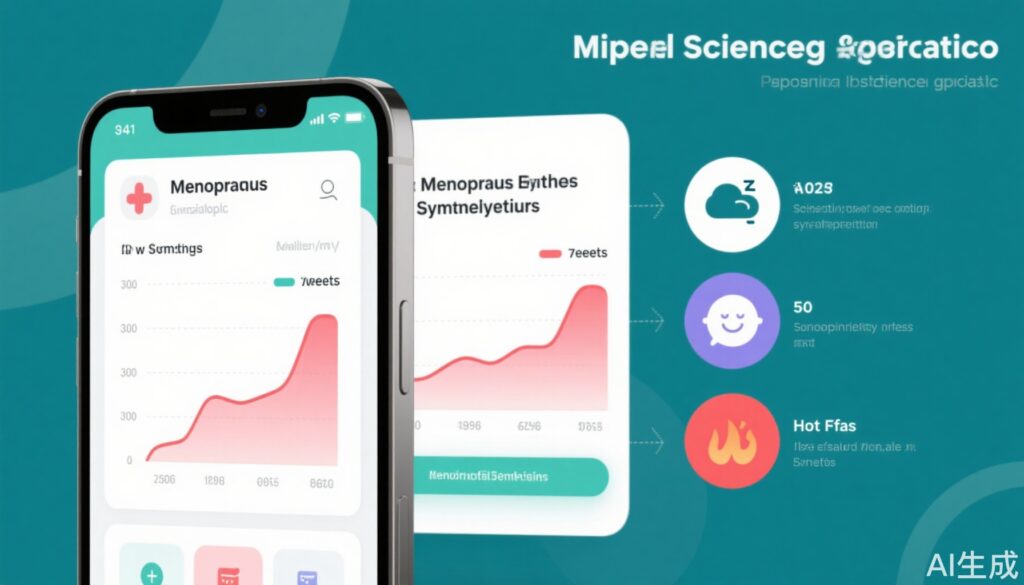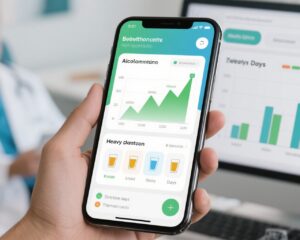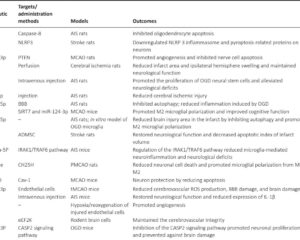Highlights
- Digital therapeutics like the Caria app demonstrate significant reductions in vasomotor symptoms (hot flashes) and behavioral health issues (depression, sleep disturbance) among women in midlife during menopause.
- Randomized controlled trials (RCTs) consistently show digital cognitive-behavioral therapy (CBT) platforms improve depressive symptoms and self-management in diverse populations beyond menopause, including postpartum depression and social anxiety disorders.
- High patient engagement and adherence are achievable with app-based interventions incorporating personalized content and coaching, though long-term maintenance of benefits requires further research.
- Systematic reviews confirm digital behavioral activation and CBT interventions reduce depressive symptoms in the short to midterm, supporting integration into clinical care pathways with attention to cultural adaptation and accessibility.
Background
Menopausal transition profoundly impacts women’s quality of life, notably through vasomotor symptoms (hot flashes, night sweats) and behavioral health issues including depression, anxiety, and sleep disturbances. Conventional treatments such as hormone therapy have limitations ranging from contraindications to patient preference concerns. Digital health technologies, especially smartphone-based solutions, offer promising, scalable modalities for symptom self-management, but robust efficacy evidence remains limited. Recent RCTs assessing mobile digital therapeutics, predominantly delivering cognitive-behavioral interventions and behavioral activation, provide critical insights into their clinical utility in midlife women’s health.
Key Content
Randomized Controlled Trial of the Caria Mobile Digital Therapeutic for Menopausal Symptoms
Duffecy et al. (2025) conducted a 6-week RCT enrolling 149 women with problematic vasomotor symptoms and at least one elevated behavioral symptom (depression, anxiety, sleep issues), randomized to the Caria app treatment (n=112) or a web-based educational control (n=37). Repeated-measures analyses revealed significant reductions in hot flash severity (Hot Flush Rating Scale), with the treatment arm improving more markedly than controls (time × treatment interaction P=0.04). Likewise, depression scores (PHQ-8) and sleep quality (PSQI) improved significantly over time in the treatment arm but not the control, with substantial decreases noted by week 3 sustained at week 6. Anxiety symptoms decreased similarly in both arms, indicating potential non-specific effects or control group improvements. App engagement was robust, averaging 53 logins over 6 weeks, indicating high adherence.
Broader Evidence from Digital Behavioral Interventions Across Mental Health Conditions
Numerous other RCTs and meta-analyses underscore the potential of digital therapeutics in behavioral health domains relevant to menopausal symptoms. For example:
- The MamaLift Plus digital therapeutic app demonstrated clinically meaningful reductions in postpartum depression symptoms compared to placebo controls, highlighting a convergent CBT-based approach for mood disorders in women (Duffecy et al., 2025).
- The INTELLECT mobile app employing CBT techniques improved depressive symptoms and cognitive monitoring skills among at-risk Japanese employees in a workplace setting, maintaining gains at 2-month follow-up (PMID: 40554801).
- A systematic review of digital behavioral activation interventions for depression and anxiety found significant improvements in depressive symptoms and quality of life at 2 to 6 months post-treatment, though effects waned by 12 months, indicating the need for sustained engagement strategies (PMID: 40526910).
- CBT delivered via smartphone apps tailored for various populations—college students, older adults with insomnia, social anxiety disorder—show consistent safety, feasibility, and efficacy, reinforcing the adaptability of digital therapeutics across age and condition spectra (PMIDs: 40536910; 40561473; 40208666).
Mechanistic and Translational Insights
Digital therapeutics leverage principles of cognitive behavioral therapy, behavioral activation, and mindfulness to reshape maladaptive behavioral and cognitive patterns underlying depression, anxiety, and sleep disturbances. The mobile format facilitates accessible, just-in-time interventions fostering self-monitoring, skills training, and behavioral change reinforcement. High-frequency engagement, as observed with Caria and similar apps, potentiates therapeutic effects through repeated learning and habit formation. However, disparities in engagement and long-term outcomes necessitate attention to user characteristics, cultural appropriateness, and integration with clinical support.
Methodological Considerations and Future Research Domains
While RCTs like Duffecy et al.’s provide compelling short-term efficacy data, many digital intervention studies feature modest sample sizes, limited diversity, and relatively brief follow-up periods, constraining generalizability and durability assessments. Increased incorporation of physiological measures (e.g., objective sleep tracking, vasomotor event monitoring) may augment subjective reports. Future RCTs should incorporate adaptive trial designs, explore hybrid models blending digital and face-to-face elements, and address mechanisms underlying differential treatment responses. Implementation research is critical to optimizing scalability, especially in underserved populations.
Expert Commentary
The evidence synthesis affirms that mobile digital therapeutics represent an important evolution in midlife women’s health management, offering non-pharmacologic, patient-centered options for managing vasomotor and behavioral symptoms. The Caria app’s demonstrated efficacy in reducing hot flash severity and improving mood and sleep underscores the capacity of digital platforms to deliver behavioral health interventions with strong adherence. This aligns with broader literature supporting digital CBT and behavioral activation for depression and anxiety across demographic groups.
Clinical guidelines increasingly recognize digital therapeutics as adjunctive or alternative modalities, particularly for patients contraindicated for hormone therapies or pharmacotherapy. However, clinicians must remain vigilant regarding patient engagement barriers, digital literacy, and symptom severity to tailor interventions appropriately. The lack of sustained anxiety symptom improvements in the Caria trial mirrors challenges in maintaining long-term symptom amelioration, highlighting a critical domain for augmentation.
From a mechanistic perspective, digital CBT apps facilitate portable, iterative cognitive restructuring and behavioral modification, impacting neurobiological stress and mood regulation pathways. The self-directed nature empowers patient agency but may require clinician support for complex cases. The high engagement metrics observed argue for user-friendly interfaces and personalized content, which may enhance adherence and outcomes.
Conclusion
Recent randomized controlled trials substantiate the efficacy of mobile digital therapeutics such as Caria in reducing menopausal vasomotor and behavioral health symptoms. These supports are consistent with expanding literature on digital behavioral interventions for mental health. Digital health interventions offer promising, accessible, and scalable approaches for symptom management in midlife women, although extended follow-up and diverse populations remain underexplored. Continued research integrating objective measures, tailored content, and clinician integration will be essential to consolidate benefits and inform clinical guidelines to enhance care delivery for menopausal women.
References
- Duffecy J, Rehman A, Gorman S, Huang YL, Klumpp H. Evaluating a Mobile Digital Therapeutic for Vasomotor and Behavioral Health Symptoms Among Women in Midlife: Randomized Controlled Trial. JMIR Mhealth Uhealth. 2025 Jun 17;13:e58204. doi: 10.2196/58204. PMID: 40526898; PMCID: PMC12187029.
- Duffecy J, et al. Evaluating the Efficacy of MamaLift Plus Digital Therapeutic Mobile App for Postpartum Depression (SuMMER): Randomized, Placebo-Controlled Pivotal Trial. J Med Internet Res. 2025 Jul 1;27:e69050. PMID: 40549508.
- PMID: 40554801. Assessing the Efficacy of the INTELLECT Cognitive Behavioral Therapy Mobile App for Anxiety and Depressive Symptoms Among At-Risk Japanese Employees: Randomized Controlled Trial.
- PMID: 40526910. Effectiveness of Digital Behavioral Activation Interventions for Depression and Anxiety: Systematic Review and Meta-Analysis.
- PMID: 40536910. An App-Based Cognitive Behavioral Therapy Program Tailored for College Students: Randomized Controlled Trial.
- PMID: 40561473. Effectiveness of Information and Communication Technology-Based Cognitive Behavioral Therapy Using the Smart Sleep App on Insomnia in Older Adults: Randomized Controlled Trial.
- PMID: 40208666. Safety and Efficacy of Modular Digital Psychotherapy for Social Anxiety: Randomized Controlled Trial.


